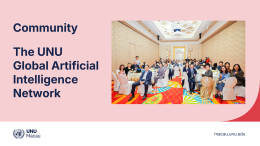On 25 April 2024, UNU-IAS contributed to a panel discussion on gender equality and responsible AI, as part of the UNU Macau AI Conference 2024 in Macau, China. A presentation by Jonghwi Park (Academic Programme Officer and Head of Innovation and Education Programme, UNU-IAS) and Yijun Won (Junior Fellow, Office of the Rector) illuminated the imperative of empowering women in STEM education, particularly in the context of advancing AI technologies.
Highlighting the reverse gender gap, in which female students outperform their male counterparts in digital citizenship competencies, maths and science, the presentation underscored the concerning trend of diminishing interest and self-efficacy among female students at the secondary level towards STEM subjects. It explored the complex factors influencing girls' engagement in STEM, spanning the individual, family and peer, school and societal levels. Advocating for gender-responsive pedagogies, supportive teaching practices, and inclusive policies, the presenters emphasized holistic measures to bridge this gap and foster greater female participation in STEM fields.
The panel also celebrated International Girls in ICT Day, with an inspiring remark by Atsuko Okuda (Director, International Telecommunication Union Regional Office for Asia and the Pacific). Panellists Jaimee Stuart (Senior Researcher, UNU Macau) and Gaelle Demolis (Governance, Peace, and Security Policy and Programme Specialist, UN Women Regional Office Asia and the Pacific) discussed the critical risks and opportunities of AI from a gender perspective, and put forward actionable recommendations.



